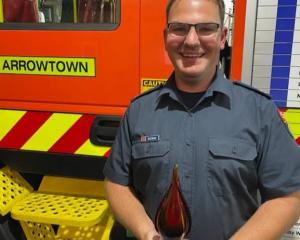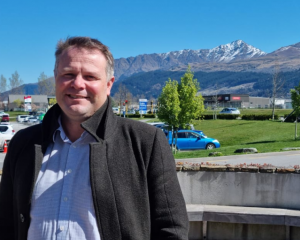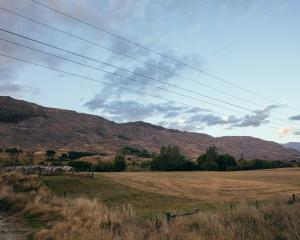Steve Rout Contracting Ltd said it extracted an estimated 3000cu m of schist last year from a private property at Earnscleugh without consent from the council, but questions have been raised about how much schist was removed, with allegations it exceeded the stated amount.
At a meeting of the council's hearings panel in Alexandra yesterday, the company applied for retrospective consent for the earthworks and quarrying already undertaken, and consent for a tidy-up of the area, which has remained untouched for more than a year.
In July 2008 the Otago Daily Times first reported the company's controversial operation, as the CODC ordered it to cease all operation and apply for retrospective consent or be liable for prosecution.
Yesterday, project manager Stacey Rout, planning consultant Andrew Henderson, and landscape architect Emily Dennison made a case for the company, in front of five submitters who oppose the application, including L and M Mining Ltd, Mintago Investments Ltd, the Central Otago Environmental Society, and nearby landowners.
Concerns were raised about more than 3000cu m of schist being removed from site, archaeological features being damaged, a natural ridgeline of tors being destroyed, rock boulders from the property being sold to Queenstown developers, and a district road being damaged by heavy machinery - the repairs for which would be borne by ratepayers.
Opponents also attacked the company's integrity, saying it had a history of bad dealings with councils, organisations, and individuals and could not be trusted.
In a letter to the CODC dated February 18, land co-owner Grant McLean, of Dunedin, said as landowners he and his siblings were concerned about Steve Rout and what had taken place.
"The quarrying work which has been carried out on the land has been done without our authority and contrary to the agreements which we had made with Steve Rout Contracting.
"We authorised the removal of a limited amount of material . . . subject to the scope of the work not exceeding the threshold beyond which resource consent would be required.
"I am at a loss to understand how this agreement came to be so badly breached, except to state the obvious that the management within Steve Rout Contracting has evidently not been equal to task," Mr McLean said.
When questioned about how much schist was extracted, Mr Rout said the company's estimation of 3000cu m was based on the number of staff and equipment it used during four days of operation.
"We have not had the site surveyed," he said.
CODC planning consultant David Whitney, who recommended consents be granted subject to 24 conditions, asked whether the panel should consider the application based on a larger amount of extracted schist.
Under the council's district plan the quarry site is an area where extraction of material exceeding 3000cu m in an area larger than 2000sq m is a discretionary activity.
Opponents called for the council to make an example of the company to deter any other organisations or individuals planning to extract material from the district.
They said Steve Rout should be denied retrospective consent, be made to clean up the site, pay costs for public road damage, and pay a bond to the council for security while doing so.
Above all, opponents wanted the company to be prosecuted.
Mr Henderson said the company accepted it had damaged archaeological features on site and altered a natural ridgeline of tors.
He said the New Zealand Historic Places Trust had supported Mr Whitney's recommended conditions of consent to prevent further damage, and the conditions were also accepted by the applicant.
He said the company also accepted Mr Whitney's other recommended conditions - as well as his suggestion a bond was not necessary.
"Someone's character is not an issue in resource consent proceedings . . . and there's nothing inherently wrong with the granting of retrospective consent," he said.












